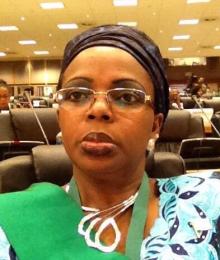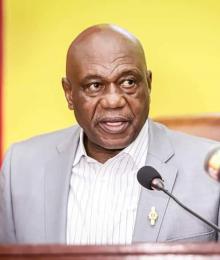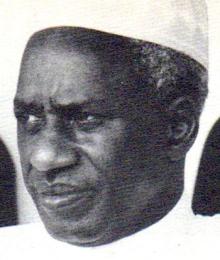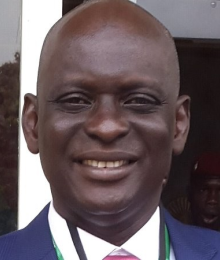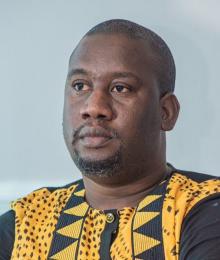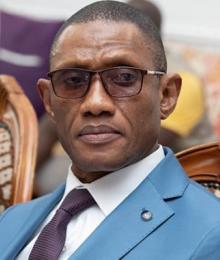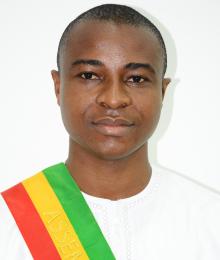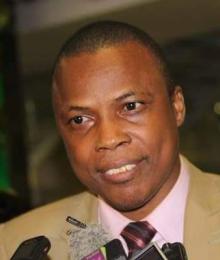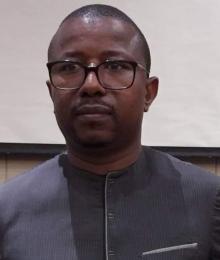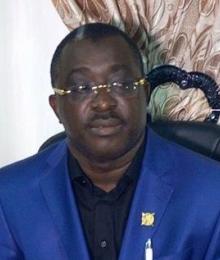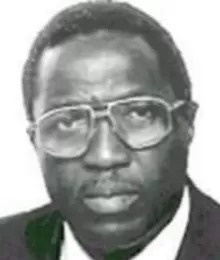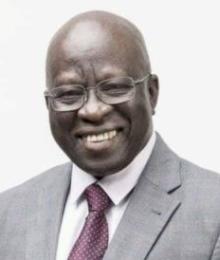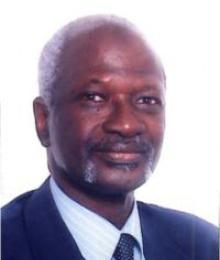
Mohamed Mansour Kaba is a Guinean political figure with a remarkable career, born in Kankan to a religious family. A civil engineer by training, graduate of the Technical University of Munich, he established himself as one of the great names in African urban planning with an international career spanning four decades. His political engagement began in his youth as leader of the JRDA, before he entered into opposition to Sékou Touré's regime.
Founder of the Pan-African Party of Guinea (PAG), he also served as Minister of Construction, Urban Planning, and Housing in 2010 during the transition led by General Sékouba Konaté. Known for his firm stance against ethnicism, which he considers "a bomb" for Guinea, Mansour Kaba maintained complex relations with former president Alpha Condé, moving from support to frontal opposition. As a writer and intellectual, he documented his journey in his memoir "A Life for Africa," offering valuable testimony about his commitment to the continent's development.
Introduction
Mohamed Mansour Kaba is an emblematic figure in the Guinean political scene, whose rich and diverse career reflects a constant commitment to the development of his country. An engineer by training, committed politician, and writer, his personal trajectory blends with the modern history of Guinea, from independence to the present day.
Earlier life and Education
Born in Kankan, in the heart of Upper Guinea, into a family deeply rooted in religious values, Mansour Kaba distinguished himself from a very young age through his intellectual abilities. At only seven years old, he completed reading the Holy Quran, already demonstrating remarkable discipline and learning capacity.
His academic journey began at Kabada primary school, where he proved to be a brilliant student. In 1953, he finished first in his class in the Primary Education Certificate (CEP) in the Kankan academy, marking the beginning of a path of excellence that would continue unabated. He then continued his education at the Technical College of Industry in Conakry-Donka, where he maintained his status as top of his class.
His thirst for knowledge and academic performance led him to the School of Public Works of French West Africa in Bamako, where he confirmed his talents by once again finishing first in his class. He eventually completed his higher education at the Technical University of Munich, Germany, specializing in civil engineering and acquiring expertise that would make him one of the great names in African urban planning.
Beyond his academic talents, young Mansour also distinguished himself in sports, becoming champion of Mali in the 800 meters and 150 meters in athletics, thus demonstrating his ability to excel in different fields.
Political Engagement
Mansour Kaba's political involvement began very early, while Guinea was still under colonial rule. He became youth leader of the JRDA party (Youth of the African Democratic Rally), the youth branch of the PDG-RDA (Democratic Party of Guinea - African Democratic Rally), the party that would lead Guinea to independence under the leadership of Sékou Touré.
After Guinea's independence in 1958, Mansour continued to play an active role in the country's political life. He led diplomatic missions to Germany on behalf of the young Guinean republic. However, when Sékou Touré's regime began to shift toward authoritarian practices, Mansour Kaba distanced himself and entered the opposition.
In 1972, he left Germany for Ivory Coast, where he worked on behalf of the Guinean opposition, preparing the ground for an eventual return to the country. This period marked the beginning of a long international career for the engineer, who would put his expertise at the service of urban development throughout Africa for nearly forty years.
Recognized Expert
Over the decades, Mohamed Mansour Kaba established himself as a reference in the field of engineering and urban development in Africa. His vision and expertise were sought in different countries across the continent, helping to shape the transforming African urban landscape.
In 2010, during Guinea's Transition period under General Sékouba Konaté, Mansour Kaba was called to serve his country as Minister of Construction, Urban Planning, and Housing. This appointment recognized his expert status and allowed him to put his experience at the service of his native country's development.
In his autobiographical book titled "A Life for Africa - Memoirs of a Committed African Engineer: 1970-2021," he shares lessons learned from his professional journey and his commitment to the continent's development, offering valuable testimony on the challenges and opportunities of African urbanization.
Pan-Africanist
One of Mohamed Mansour Kaba's deepest convictions is the necessity to overcome the ethnic divisions that fragment Guinean society. In January 2017, he stated unequivocally that "Guinea is sitting on an ethnic bomb," a lucid analysis of the tensions undermining the country's political and social development.
This concern led him to found the PAG, the Pan-African Party of Guinea, later renamed Diama. Through this political formation, he promotes a unifying vision that transcends ethnic affiliations: "We are neither Fulani, nor Susu, nor Malinke. We are Pan-Africanists. And it is only with Pan-Africanism that we can overcome ethnic divisions."
For Mansour Kaba, Guinea's political and economic development necessarily requires the abolition of ethnic questions from political debate. His Pan-Africanist vision thus appears as a response to the divisions that weaken the Guinean social fabric and compromise the country's development prospects.
Relations with Alpha Condé
The relationship between Mohamed Mansour Kaba and Alpha Condé illustrates the complexities and paradoxes of Guinean political life. The two men have known each other for more than fifty years, but their relationship has experienced significant ups and downs.
From 1964 to 1998, although acquainted, they maintained distant relations, with Mansour refusing to campaign alongside Alpha Condé, criticizing his leadership style: "He doesn't need colleagues, he needs followers, and I cannot be anyone's follower."
However, when Alpha Condé was imprisoned by Lansana Conté's regime in 1998, Mansour Kaba defended him as a lawyer, not out of personal friendship but from democratic conviction: "My conscience forbade me from not reacting." He even organized a press conference to demand Alpha Condé's release and his appointment as Prime Minister of a transitional government.
After Alpha Condé's election to the presidency in 2010, Mansour Kaba moved closer to the new administration, going so far as to dissolve his Jamma party to integrate it into Alpha Condé's RPG. However, this alliance did not last. Disenchanted by the regime's direction, he left the presidential majority to create the Pan-African Party of Guineans (PPG).
In 2019, the break was final. In an interview, Mansour Kaba declared: "I no longer recognize my friend Alpha Condé," criticizing in particular his desire to modify the Constitution to seek a third term. He even addressed an open letter to him entitled "A final piece of advice to my friend," urging him to "hand over the apron with honor and dignity" at the end of his second term.
Critique of Development Failures in Guinea
Mansour Kaba is particularly critical of the Guinean paradox: a country with abundant natural resources that ranks among the poorest on the continent. Nicknamed the "Water Tower of Africa" due to the many rivers that originate there (Senegal, Niger, Gambia), endowed with a subsoil exceptionally rich in mineral resources, Guinea nevertheless struggles to ensure the well-being of its population.
For him, the main cause of this delay is clear: "It's because we don't have rulers." He relates the words of a French friend who, since the time of Sékou Touré, had identified the country's fundamental problem: "The people are more intelligent than the rulers."
Mansour Kaba particularly points to institutional dysfunctions and the inversion of economic values: "In Guinea, everything works upside down. Normally, wealth should be found in the private sector, but in Guinea, it's the civil servants who are rich."
The electricity sector perfectly illustrates this development failure. More than sixty years after independence, the Guinean capital still does not benefit from reliable and continuous electricity supply, a situation that Mansour Kaba considers unacceptable.
Recent Positions and Vision for the Future
After the military coup of September 2021 that overthrew Alpha Condé, Mansour Kaba showed no mercy for his former friend, declaring in April 2022 that "Alpha Condé's place is in prison" and that he should be "brought before the courts" to answer for his governance.
More recently, in September 2024, at the age of 84, he criticized the draft of the new Constitution presented by the National Transitional Council (CNT), denouncing particularly the provisions limiting the age of presidential candidates and seeing it as an "intolerable discrimination" that removes "from citizens the freedom to vote for candidates of their choice."
He also opposed independent candidacies in the presidential election, believing that with "the major mining projects that are being realized," Guinea would risk being "delivered to mafia groups" if candidates without party anchoring could run.
In November 2024, as the theoretical end of the transition approached, Mansour Kaba expressed his skepticism about respecting the timeline, estimating that "December 31 will not be the end of the transition" due to accumulated delays in organizing the constitutional referendum and elections.
Conclusion
Through his career as an engineer, politician, and committed intellectual, Mohamed Mansour Kaba embodies a certain vision of African development, based on technical expertise, civic engagement, and overcoming ethnic divisions. His personal trajectory, intimately linked to Guinea's contemporary history, offers valuable testimony on the challenges and hopes of a country in search of its destiny.
A lucid critic of the governance failures that have hindered the development of his native country, a tireless promoter of a Pan-Africanist vision that transcends ethnic divisions, Mansour Kaba remains, despite his advanced age, a respected voice in the Guinean public debate, carrying an experience and wisdom forged through decades of commitment to serving Africa.











